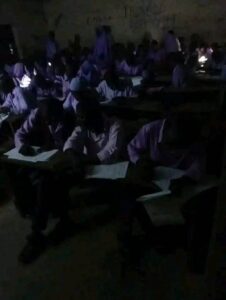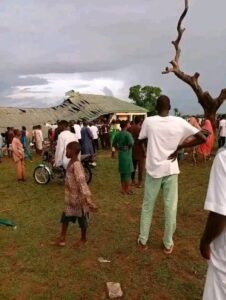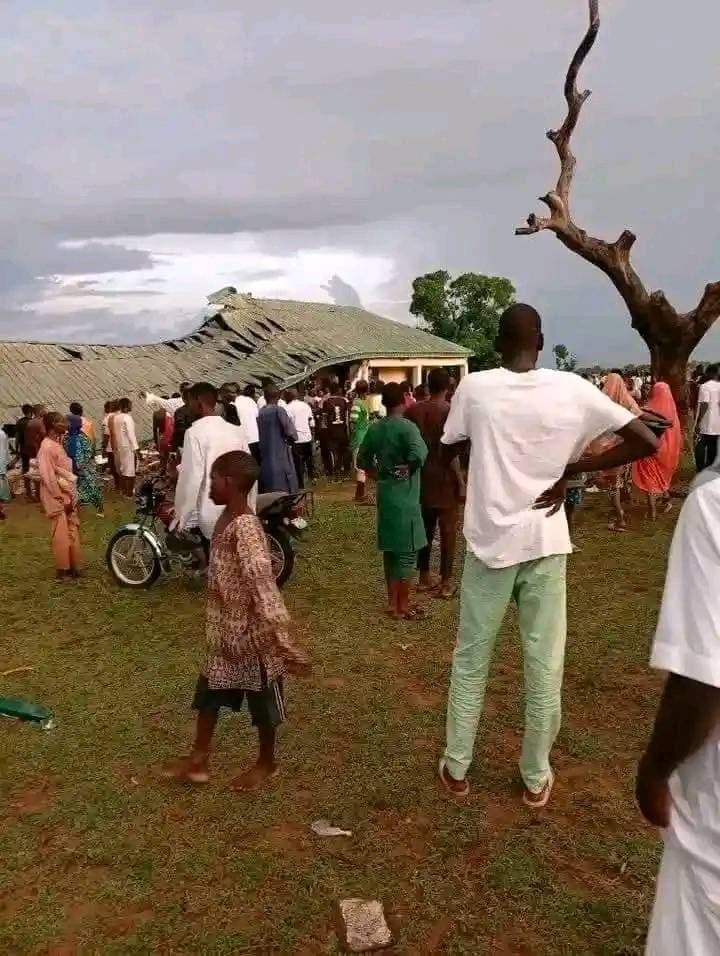A classroom block at Government Secondary School, Namnai, in Gassol Local Government Area of Taraba State, Nigeria, collapsed on Wednesday, May 28, 2025, at approximately 6 p.m., trapping dozens of students, teachers, National Youth Service Corps (NYSC) members, and exam supervisors. The incident occurred during a heavy downpour accompanied by a fierce windstorm, as students were sitting for the West African Senior School Certificate Examination (WASSCE), a critical academic milestone for secondary school students across West Africa. The collapse has sparked renewed concerns about the dilapidated state of educational infrastructure in Nigeria and the safety of students during examination periods.
A Sudden Catastrophe During a Crucial Exam
The ill-fated event unfolded as the second batch of WASSCE candidates had just begun their examination session. The first batch of students had completed their papers earlier in the day and left the premises, narrowly escaping the disaster. According to eyewitness accounts, the storm’s intensity escalated rapidly, with powerful winds and torrential rain battering the school. Without warning, the classroom block’s structure gave way, sending concrete and debris crashing down on those inside.
The collapsed building was one of the school’s main examination halls, a facility that, like many others in Nigeria’s public education system, had reportedly been in poor condition for years. The sudden collapse left students and staff trapped under rubble, sparking panic and chaos in the small community of Namnai. The exact number of individuals inside the hall at the time of the collapse remains unclear, but early reports suggest dozens were affected.

Community Rallies to Rescue Trapped Victims
In the immediate aftermath, local residents, parents, and passersby sprang into action, risking their own safety to dig through the debris and rescue those trapped. Their swift response likely saved lives, as they worked tirelessly to free students and staff pinned under the collapsed structure. “It was like something out of a nightmare,” said Musa Ibrahim, a local shopkeeper who joined the rescue efforts. “We heard screams and saw people running toward the school. Everyone just started pulling away the rubble with their hands.”
Emergency services eventually arrived, but the community’s quick intervention was critical in the absence of immediate professional aid. Several students sustained injuries, including fractures and lacerations, and were rushed to a nearby Primary Healthcare Centre for treatment. While no fatalities have been officially confirmed, the severity of some injuries has raised fears that the toll could worsen. Teachers, NYSC members serving as exam invigilators, and supervisors were also among the victims, though details about their conditions remain scarce.

A Storm’s Wider Impact
The windstorm responsible for the collapse did not spare the surrounding community. Homes in Namnai and nearby areas suffered significant damage, with roofs blown off and structures weakened by the relentless rain and wind. The storm’s ferocity underscored the vulnerability of rural communities in Taraba State, where infrastructure is often ill-equipped to withstand extreme weather. Flooding caused by the downpour further complicated rescue efforts and left roads impassable, delaying the arrival of emergency responders.
The West African Examinations Council (WAEC), which administers the WASSCE, issued a statement apologizing for disruptions to the examination schedule in Taraba State. The storm’s impact extended beyond Namnai, with reports of logistical challenges in other areas, including the state capital, Jalingo. In Jalingo, floodwaters stranded students, teachers, and exam officials at examination centers until after 1 a.m. on Thursday, May 29, as they waited for conditions to improve. WAEC has not yet announced whether affected candidates will be given an opportunity to retake their exams or how the disrupted schedule will be addressed.
The collapse of the examination hall has reignited long-standing concerns about the state of Nigeria’s public school infrastructure. Many schools, particularly in rural areas like Gassol, operate in buildings that are decades old, poorly maintained, and vulnerable to natural disasters. Education advocates and community leaders are now calling for urgent action to address these systemic issues.
“This tragedy could have been prevented,” said Aisha Abdullahi, a local education activist. “For years, we’ve been warning about the condition of our schools. These buildings are death traps, and now our children are paying the price.” The incident has also drawn attention to the broader challenges facing Nigeria’s education system, including underfunding, inadequate facilities, and a lack of proactive maintenance.
Taraba State’s government has yet to issue an official statement on the collapse, but pressure is mounting for an investigation into the structural integrity of the school and others like it across the state. Parents and community members are demanding accountability and immediate measures to ensure student safety. “My daughter was in that hall,” said Fatima Usman, a mother of a WASSCE candidate. “She’s alive, but injured. How are we supposed to trust that our children are safe when they go to school?”
The Human Toll and Ongoing Recovery
As of now, the full extent of the injuries and damage is still being assessed. The Primary Healthcare Centre in Gassol is reportedly overwhelmed, with limited resources to treat the influx of patients. Community leaders have called for additional medical support and supplies to aid the recovery process. Meanwhile, the psychological impact on students, many of whom were already under immense pressure due to the high-stakes nature of the WASSCE, cannot be overstated.
The WASSCE is a pivotal examination that determines students’ eligibility for tertiary education and future career opportunities. The disruption caused by the collapse and flooding has left candidates anxious about their academic prospects. “I was in the middle of answering a question when the roof came down,” said 17-year-old Halima Sani, one of the injured students. “Now I don’t even know if I’ll be able to finish my exams.”
Join our Whatsapp channel to stay updated always!


